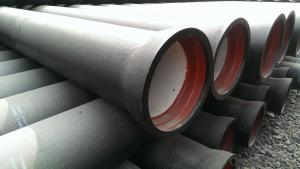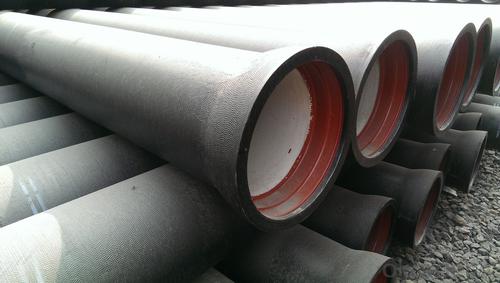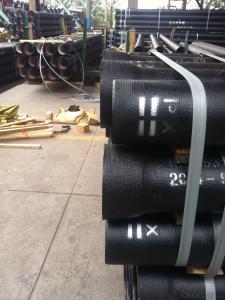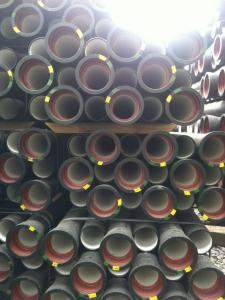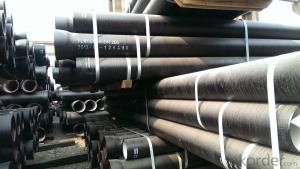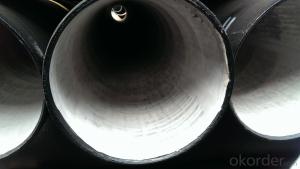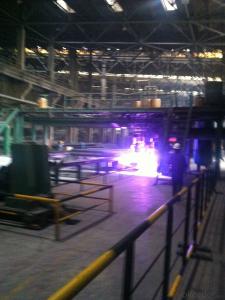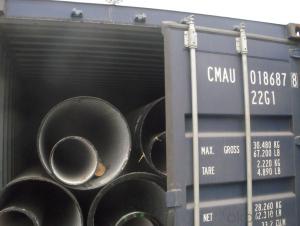DUCTILE IRON PIPES AND PIPE FITTINGS K7 DN350
- Loading Port:
- Tianjin
- Payment Terms:
- TT OR LC
- Min Order Qty:
- 25 m.t
- Supply Capability:
- 30000 m.t/month
OKorder Service Pledge
OKorder Financial Service
You Might Also Like
Material : Ductile Cast Iron
Size Range : DN 80mm to DN 2000mm
Unit Effective Length : 6m or 5.7m
Manufacture Standard: ISO 2531:1998/ EN 545:2006/EN 598:2007
Annual capacity : 200,000 tons
Coating Exterior: Zinc 130g/m2 according to ISO 8179-1 and bitumen coating 70 microns.
Cement Interior: Portland Cement/ High Alumina Cement/ Sulphate Resisting Cement Lining according to ISO 4179
Special requirements on external coating and internal lining can be applied
We also provide accessories such as SBR/EPDM rubber gaskets, lubricant paste, pipe caps, PE sleeves, etc.
Additional Parts:
Each pipe is strictly inspected according to related standard to ensure permanently high performance.
Easy Installation at site and service free for life
Long Service Lifespan
Quotation will arrive you within 24hours once we get your inquiry.
We guarantee offering you a competitive price.
A copy of original inspection reports of pipes will be offered after shipment.
Photos of loading process will be sent to the customer after shipment effect.
We will follow-up the delivery progress after shipment effect and update to the customer on weekly basis.
- Q: How does ductile iron pipe perform in high-pressure gas applications?
- Due to its unique characteristics and properties, ductile iron pipe is an outstanding option for high-pressure gas applications. Firstly, its high tensile strength enables it to withstand the immense pressure exerted by gas flowing through the pipeline, ensuring leakage or rupture-free containment. Additionally, ductile iron pipe exhibits remarkable resistance to corrosion, making it ideal for gas applications that may encounter moisture, chemicals, or other corrosive substances. This corrosion resistance guarantees the pipe's longevity and minimizes the risk of damage or failure caused by corrosion. Another advantage of ductile iron pipe in high-pressure gas applications is its capability to handle thermal expansion and contraction. As gas is transported under high pressures, temperature fluctuations occur, resulting in pipeline expansion and contraction. However, ductile iron pipe's flexibility allows it to adapt to these changes without compromising its performance or structural integrity. Furthermore, ductile iron pipe's smooth interior surface reduces friction losses and pressure drops, resulting in efficient gas flow. This smoothness also reduces the likelihood of gas impurities or debris becoming trapped, potentially leading to blockages or flow disruptions. In conclusion, when it comes to high-pressure gas applications, ductile iron pipe is a dependable and durable choice. Its high tensile strength, corrosion resistance, ability to handle thermal expansion, and smooth interior surface all contribute to its exceptional performance in demanding conditions.
- Q: Does the cast iron pipe for spheroidal graphite need corrosion protection when laying underground?
- Ductile iron pipe is a kind of cast iron pipe.
- Q: What are the requirements for the hydrostatic test of ductile iron pipes?
- The hydraulic pressure test shall be carried out in the backfill before trying to allow the pressure after passing the backfill, backfill, the graded gravel fill to 300mm above the top of pipe, and then the soil backfill, backfill process by 200~300 tamped pipeline above 500mm within more than 500 can be used in artificial ramming, mechanical compaction. The degree of compaction shall not be less than 0.93.
- Q: Can ductile iron pipes be used in acidic environments?
- Yes, ductile iron pipes can be used in acidic environments. Ductile iron has excellent resistance to corrosion, including acidic conditions, due to its protective oxide layer. This makes it a suitable choice for applications in which exposure to acids is expected.
- Q: What effect does magnesium play in nodular cast iron?
- The role of magnesium as spheroidizing agent used in iron spheroidizing treatment, promote water ink is made of iron, carbon in liquid iron spherical graphite precipitation.
- Q: Can ductile iron pipe be used for wastewater treatment plant sludge handling?
- Yes, ductile iron pipe can be used for wastewater treatment plant sludge handling. Ductile iron pipes are known for their durability, corrosion resistance, and ability to withstand heavy loads, making them suitable for handling sludge in wastewater treatment plants.
- Q: How to distinguish flexible and rigid interfaces between cast iron pipe joints
- Flexible connections can be kept watertight at any angle (lateral or vertical), and rigid, where the interface of a pipe is easy to crack if a slight earthquake is encountered
- Q: What is the typical weight of ductile iron pipes?
- The typical weight of ductile iron pipes can vary depending on the size and specifications, but they generally range from a few hundred pounds to several thousand pounds per linear foot.
- Q: Can ductile iron pipes be repaired if they get damaged?
- Yes, ductile iron pipes can be repaired if they get damaged. The repair process involves identifying the damaged portion of the pipe and assessing the severity of the damage. If the damage is minor, it can be repaired using various techniques such as welding or epoxy lining. For more extensive damage, sections of the pipe may need to be replaced. Pipe repair professionals have the expertise and equipment to identify and fix damaged ductile iron pipes, ensuring their continued functionality and longevity.
- Q: How can the ductile iron pipe be welded?
- If the hole on the ductile iron pipe, you can use special hoop lined flexible rubber ring, rubber ring and pipe wall coating with rubber ring, glue to be fixed.
Send your message to us
DUCTILE IRON PIPES AND PIPE FITTINGS K7 DN350
- Loading Port:
- Tianjin
- Payment Terms:
- TT OR LC
- Min Order Qty:
- 25 m.t
- Supply Capability:
- 30000 m.t/month
OKorder Service Pledge
OKorder Financial Service
Similar products
Hot products
Hot Searches
Related keywords
